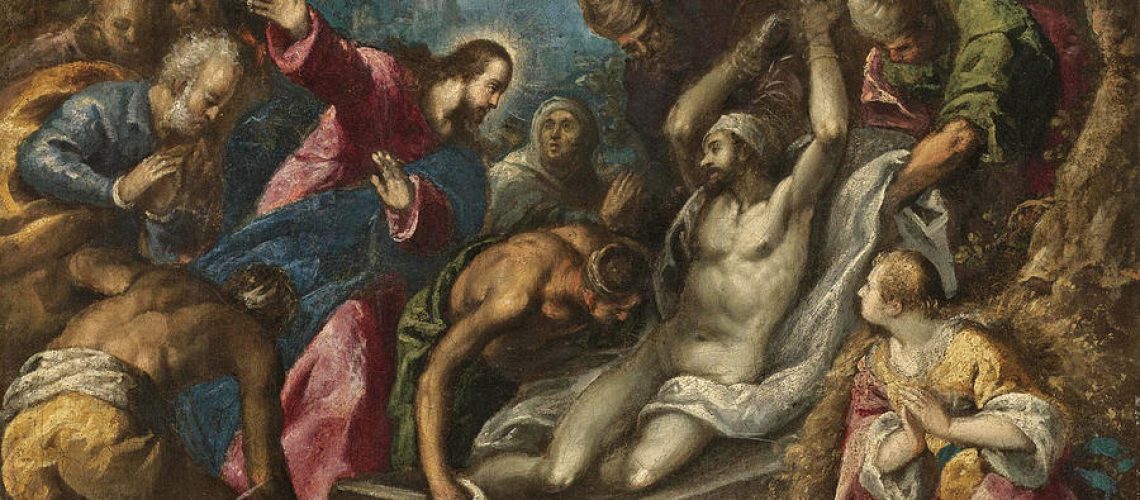
Pastor Mary Anderson
Pastor Mary is the Interim Pastor at Christ Lutheran Church
Who could have known that when we began our Lenten discipline of prayer, fasting, and works of love; that we would have to fast from so much. We are fasting from physical contact, from social gatherings, from our favorite restaurants, from schools and workplaces. Some are fasting from a paycheck, from regular meals. As a faith community, we are fasting from worship, from Lenten Wednesdays, and fasting from Holy Communion. Instead, we feast on God’s Word alone which is grace enough for now.
This past Sunday we read the story of the raising of Lazarus from John 11. It’s not uncommon to have families request part of this story as the gospel reading at the funeral of a loved one. And we can see why – Jesus himself experiences the death of someone he loved. He’s like us in having those feelings. He is crying at the edge of a grave like we do. And then, of course, he’s not like us in this story because he declares to Martha and to us: I am the resurrection and the life. Those who believe in me, even though they die, will live.
Even if we staunch believers don’t say it out loud, this story also lifts up a couple of issues we have with Jesus. I can also assure you that this story lifts up some problems with Jesus that staunch skeptics and nonbelievers have no problem talking about out loud. They wonder how we can believe in Jesus when there are such glaring flaws.
There are two main problems with Jesus that the people in the story saw and that many people continue to question.
The first problem is with Jesus not showing up in time. Mary and Martha call it out for us: Lord, if you had been here, my brother would not have died. If Jesus is really for us, then why does he often seem too late with his healing, his peace, his mercy?
The second problem is with Jesus’ inconsistency. It was the people gathered around Martha, the mourners, who bring up this Jesus problem. When Jesus starts to cry along with the sisters, some who were standing around said, “Wow, he really did love Lazarus.” But other people said, “Really? He was able to cure the blind man, couldn’t he have kept his best friend from dying?”
Jesus’ tardiness and his spotty usefulness in times of trouble are real problems for the believing, the barely believing, and the non-believers. Perhaps at different moments or different times in our lives we have been or will be all of these. How many of us have prayed at the bedside of a loved one in our lives, prayed for healing only to have that person die anyway? How can we understand such things? How can we keep believing that Jesus is life and resurrection?
There are no logical answers to these questions, even though we crave the answers with every part of our being.
Surrounded by the disappointment of his friends and the skepticism of the crowd, Jesus goes to the tomb, orders the stone to be removed, gives a prayer of thanks to God, and calls Lazarus out.
No one standing there is said to have believed in Jesus’ power. The crowd doesn’t expect Lazarus to come out when the stone is rolled away. The people assume death is final with no remedy, especially after four whole days.
The story shows us that the crowd didn’t have to believe in Jesus or anything else for Lazarus to come out. Human belief isn’t the source of that new life. Jesus is the source of that new life through the great power that belongs to God with whom all things are possible. Our skepticism, our lack of belief, doesn’t diminish God and it doesn’t stop God.
Thank goodness, right?! That’s the good news. Many things bind us, but every day the word of the Lord frees someone. That’s the message of the story. God makes something good come from the destruction all around us.
In this pandemic, some will recover, others will not. By the end, we’ll have a nice collection of stories of heroes and stories of healing. We’ll have a depressing collection of stories of failure and death. We won’t be able to explain it to anybody’s satisfaction, really. Some people will see God in the midst of it. Others won’t. Some will claim God as obviously tardy to the task and useless. But, people of faith don’t put a lot of stock in the obvious. It’s our greatest strength as far as we can tell. God is beyond our logic, our language, our expectation. It’s a good thing because our logic and language are so limited.
As we journey through Holy Week, many many things will not be logical or practical or popular. This is God’s way in the world. We don’t always understand why things happen the way they do, but Jesus has staked his life on the promise that God is both all-powerful and all-loving, despite all our theodicy debates to the contrary. Both of those are about to be on display as we near Jerusalem and enter through the gates of the mystery of God. Prepare yourselves.


